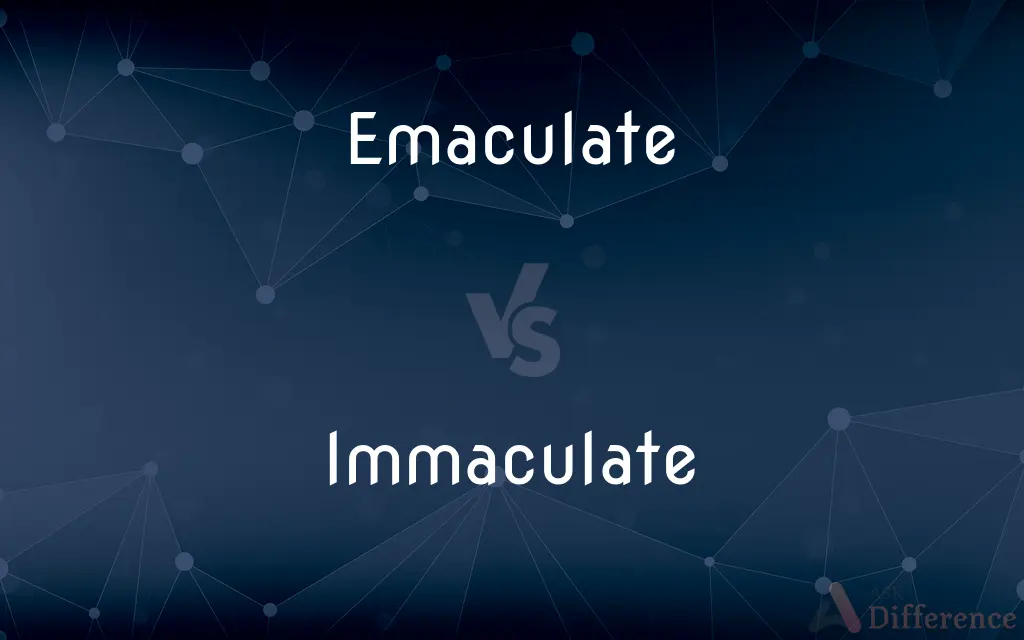Emaculate vs. Immaculate — What's the Difference?
By Tayyaba Rehman — Updated on November 2, 2023
"Emaculate" is not a recognized word in standard English dictionaries. You might be referring to "emaciate," which means to waste away physically. "Immaculate" means perfectly clean or spotless.

Difference Between Emaculate and Immaculate
Table of Contents
ADVERTISEMENT
Key Differences
The difference between "emaciate" and "Immaculate" is substantial, primarily because "emaculate" appears to be a misspelling or a confusion with "emaciate," which means to become extremely thin or lean, usually due to starvation or illness. Immaculate, however, describes something that is perfectly clean, pure, or free from fault or error.
"Emaciate" conveys a sense of reduction or depletion, often in a harmful or undesirable way. Immaculate, on the opposite spectrum, denotes a state of flawlessness or perfection, often in cleanliness or morality.
Whereas emaciate would be used in contexts of health and physical condition, pointing towards a negative state of being, immaculate is often used in positive contexts – to describe cleanliness of spaces, purity of actions, or even to signify an unblemished reputation.
In literature, "emaciate" might be used to describe a character’s physical deterioration, painting a picture of suffering or neglect. Immaculate could be employed to set a scene of an untouched, pristine environment or to characterize a person’s virtuous nature.
To sum it up, "emaciate" (if emaculate is the intended word) refers to the process of losing flesh, becoming thin, or atrophying, while immaculate signifies something that is free from blemishes, stains, or moral corruption.
ADVERTISEMENT
Comparison Chart
Definition
To waste away or become abnormally thin.
Perfectly clean, neat, or tidy.
Usage in Health
Refers to a decline in physical condition.
Not typically used in a health context.
Moral Connotation
Does not have a moral implication.
Often associated with purity or moral perfection.
Grammatical Form
Generally used as a verb.
Used as an adjective.
Typical Context
Medical or health-related discussions.
Descriptions of cleanliness or faultlessness.
Compare with Definitions
Emaculate
To become extremely thin or weak.
The illness caused her to emaciate rapidly.
Immaculate
Perfectly clean or pure.
She kept her kitchen in immaculate condition.
Emaculate
To decline in vitality.
His face had emaciated after months of stress.
Immaculate
Free from flaws or mistakes.
He delivered an immaculate performance on stage.
Emaculate
To wither or waste away physically.
Without proper nutrition, the plants started to emaciate.
Immaculate
In a state of perfect neatness.
The hotel room was immaculate upon our arrival.
Emaculate
To cause to lose flesh so as to become very thin.
The harsh conditions on the island emaciated the castaway.
Immaculate
Free from moral blemish or impurity.
Her reputation was immaculate.
Emaculate
To undergo emaciation.
The patient began to emaciate despite the treatments.
Immaculate
Impeccably clean; spotless
"The room was as spare and immaculate as a monk's cell" (Caroline Preston).
Emaculate
(obsolete) To clear from spots or stains, or from any imperfection.
Immaculate
Free from sin.
Emaculate
To clear from spots or stains, or from any imperfection.
Immaculate
Free from fault or error
An immaculate record on the job.
Immaculate
(Biology) Having no spots or marks.
Immaculate
Absolutely tidy, having no blemish or stain.
Immaculate
(zoology) (botany) Lacking blotches, spots, or other markings.
Immaculate
(figurative) containing no mistakes.
Immaculate
(figurative) morally pure, free from sin.
Immaculate
Without stain or blemish; spotless; undefiled; clear; pure.
Were but my soul as pureFrom other guilt as that, Heaven did not holdOne more immaculate.
Thou sheer, immaculate and silver fountain.
Immaculate
Completely neat and clean;
The apartment was immaculate
In her immaculate white uniform
A spick-and-span kitchen
Their spic red-visored caps
Immaculate
Free from stain or blemish
Immaculate
Without fault or error;
Faultless logic
Speaks impeccable French
Timing and technique were immaculate
An immaculate record
Immaculate
Precise; detailed and without error.
The artist's brush strokes were immaculate.
Common Curiosities
Can immaculate be used to describe someone's character?
Yes, if someone has an unblemished moral character, they can be described as immaculate.
Is "emaculate" a typo?
It is likely a typo or confusion with "emaciate," which is the correct term.
How do you use immaculate in a sentence?
"He wore an immaculate white suit to the wedding."
What does it mean to emaciate?
To emaciate means to become very thin or weak, especially due to a lack of nutrition or illness.
Can objects be described as immaculate?
Yes, objects like rooms or clothes can be described as immaculate when they are perfectly clean.
Is emaciate a common medical term?
Yes, it is used in medical contexts to describe severe weight loss.
Is emaciate always negative?
Generally, yes, because it implies deteriorating health or well-being.
What's the noun form of emaciate?
The noun form is "emaciation."
Are there degrees of emaciation?
Yes, medical professionals may describe emaciation ranging from mild to severe based on body mass index and other health indicators.
Can one emaciate intentionally?
While it can be a result of intentional actions, like extreme dieting, it's generally used in a negative health context.
What is an immaculate conception?
In Christian theology, it refers to the belief that Mary was free from original sin from the moment of her own conception.
Does immaculate have synonyms?
Yes, synonyms include spotless, pristine, and flawless.
Can animals emaciate?
Yes, animals can also become emaciated, often due to neglect or illness.
Is immaculate a religious term?
It can be, especially in the context of the Immaculate Conception, but it's also widely used secularly.
What's the opposite of immaculate?
The opposite could be dirty, soiled, or stained.
Share Your Discovery

Previous Comparison
Ally vs. Allie
Next Comparison
Absolute vs. ObsoleteAuthor Spotlight
Written by
Tayyaba RehmanTayyaba Rehman is a distinguished writer, currently serving as a primary contributor to askdifference.com. As a researcher in semantics and etymology, Tayyaba's passion for the complexity of languages and their distinctions has found a perfect home on the platform. Tayyaba delves into the intricacies of language, distinguishing between commonly confused words and phrases, thereby providing clarity for readers worldwide.












































